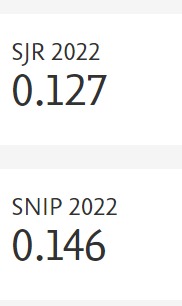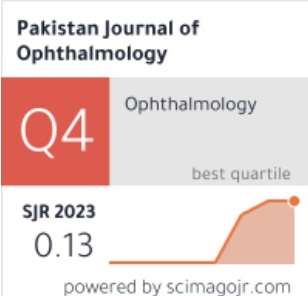The Impact of Induced Anisometropia on Binocular Vision
Doi: 10.36351/pjo.v41i1.1919
DOI:
https://doi.org/10.36351/pjo.v41i1.1919Abstract
Purpose: To assessthe impact ofinduced anisometropia on binocular visual function.
Study Design: Quasi experimental study.
Place and Duration of Study: Optometry clinicsof Qassim University, from January 2024 to June 2024.
Methods: The study included 60 subjects of 16-26 years. Anisometropic myopia was induced by plus lenses (+1DS, +2DS, +3DS) and anisometropic hypermetropia was induced by minus lenses (-1DS, -2DS, -3DS) keeping them emmetrope with normal binocularity. Subjects with squint, suppression and amblyopia were excluded. Clinical assessment included;assessment of vision,refraction and near phoriawith Maddox wing. Assessment of bifovealfusion, suppression and diplopiawas done using Worthfour dot test and stereoscopic vision with Titmus fly test. Data was analyzed by using SPSS- v.25.
Results: There were 66.7% males and 33.3% females. Mean agewas 22.37±2.81 years. A significant difference in stereoacuity was found in 1D (41.75±130.26 sec arc), 2D (233.77±172.09 sec arc) and 3D (399.267±181.31 sec arc) anisometropic myopia (p˂0.001) as well asanisometropic hypermetropia(p˂0.001).There was no significant difference in stereoacuity between males and females (p ˃ 0.05). However, diplopia was higher in 3D of anisometropic hyperopia (73.3%) than anisometropic myopia (66.7%). Monocular suppression was present in 6.7% and 3.3% of 3D anisometropic hyperopia and anisometropic myopia respectively. Alternate suppression was present in 1.7% of eyes with 2D anisometropic hyperopia only.
Conclusion: Small degree of anisometropia significantlyimpact binocular vision. It affects bi-foveal fusion, leads to diplopia, suppression and reduction in stereopsis.
Downloads
Published
How to Cite
Issue
Section
License
Copyright (c) 2024 Raghda Mutwaly

This work is licensed under a Creative Commons Attribution-NonCommercial 4.0 International License.






